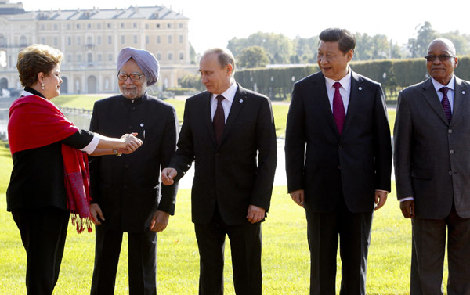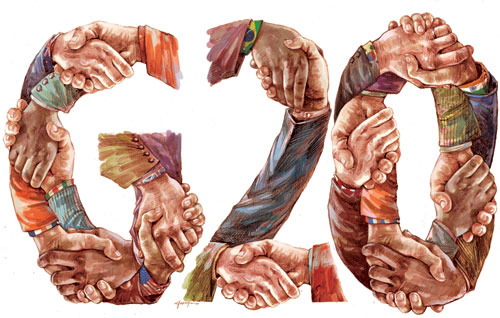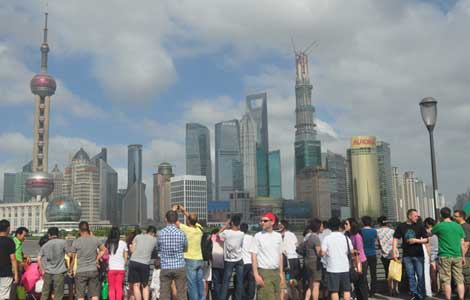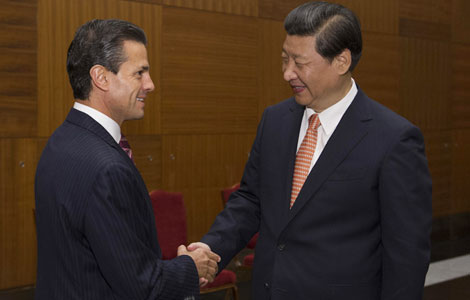Emerging markets must be heard
Updated: 2013-09-06 02:57
(China Daily)
|
||||||||
Dan Steinbock, research director of International Business at the India, China and America Institute

1 Whether the next US Federal Reserve leader will be current vice-chairwoman Janet Yellen, former treasury secretary Larry Summers or somebody else, the simple reality is that moving too fast or too slow could severely disrupt the lingering recovery in the US. Consequently, the Fed will opt for gradual unwinding. Nonetheless, the economically more vulnerable BRICS nations are not immune to adverse impacts.
In the short-term, the volatile “hot money” flows into BRICS have declined. India's growth potential has been downgraded. Brazil struggles to sustain its growth trajectory. In Russia, growth forecasts have been reduced. Similar challenges have been seen in Turkey, Mexico, Indonesia and other large emerging economies.
As they say, “easy come, easy go”. When foreign investment is driven by opportunism, emerging economies must remain cautious. They need patient foreign investment rather than fickle hot money. Also, it seems that current markets are a bit too pessimistic about some BRICS nations and too optimistic about the G7 club, particularly Europe and Japan.
2 In the late 1990s, the rapid recovery after the Asian financial crisis was based on export-led growth. Today, there are fewer opportunities. It is important that BRICS can deter efforts at protectionism and sustain international trade and investment in a very challenging economic environment.
It is also vital that the BRICS nations work together to accelerate institutional reforms in international multilateral and financial organizations. The International Monetary Fund, World Bank and World Trade Organization are still led by the postwar victorious nations 70 years after the end of World War II. As a result, the playing field is not even in international economy, finance, trade and investment.
The BRICS nations should not wait for substantial change that is not likely to happen. Rather, they could move ahead on their own. Despite challenges, a BRICS development bank would be one way to at least focus attention, energy and financial support to issues that matter more to emerging and developing economies.
3 For half a decade now, major advanced economies have engaged in different kinds of quantitative easing. That era will end in the fall as the US Fed will first gradually reduce its purchases of US debt and, by the mid-2010s, hopes to begin raising rates. Over time, Europe and Japan hope to follow in its footsteps.
Until recently, the BRICS nations have largely responded to these shifts that have been shaped by the G7. The G7 and BRICS work together within G20, but the two live in different worlds. In the former, per capita income is $30,000 to $50,000 per year. In the emerging nations, it is closer to $5,000 to $15,000 annually. As a result, the BRICS nations have interests of their own within the global framework.
As the era of quantitative easing is changing, it would be vital for BRICS leaders to develop a joint platform in order to shape the global agenda more proactively.

 China, Russia a step closer on gas supply
China, Russia a step closer on gas supply
 18-year-old panda conceives triplets
18-year-old panda conceives triplets
 Testing times for G20 leaders
Testing times for G20 leaders Homemade choppers make aerobatic stunt debut
Homemade choppers make aerobatic stunt debut
 Shanghai's visa-free policy lifts tourism
Shanghai's visa-free policy lifts tourism
 Panda twin cub born at Atlanta Zoo
Panda twin cub born at Atlanta Zoo
 Xi, Mexican president meet for third time
Xi, Mexican president meet for third time
 Samsung unveils smartwatch ahead of rival Apple
Samsung unveils smartwatch ahead of rival Apple
Most Viewed
Editor's Picks

|

|

|

|

|

|
Today's Top News
China, Russia a step closer on gas supply
Japan to test wall for leaking water
Low-budget education abroad for working-class
Shanghai's visa-free policy lifts tourism
Brazil asks for apology from US on spying
Xi calls for closer G20 ties
US service providers eye China
Commuter aviation expected to take flight soon
US Weekly

|

|






